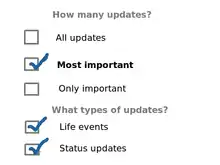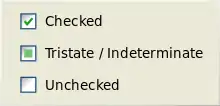Unclick
Unclick is a term, increasingly applied in the context of computing, in which a computer user un-chooses or de-selects a specific preference,[1][2] typically by moving a cursor over a selection, and pressing the left mouse button. As a result, the check mark image or dark circle inside a Checkbox or a Radio button is removed.[3] While in January 2012 the term unclick is generally not formally defined in dictionaries,[4][5] the term has been used in popular parlance in countries such as the United States,[6] Britain,[7] and Canada.[8]



Background
As the Internet becomes an increasingly popular medium for marketers, vendors and marketers often presume that a user will prefer certain choices,[6][9] such as receiving emails in the future, having specific computer settings, or preferring that specific programs will be operational when a computer is turned on. As a result, it is sometimes necessary for a user to unclick these choices[10] to avoid exposure to unwanted advertising,[11] or to avoid a situation in which a different website is chosen for one's home page.[7] In Internet marketing, unclicking is often required for a user to avoid being billed automatically for unnecessary services, sometimes part of a deceptive business practice termed negative option billing. A user's Facebook privacy settings have often been chosen in advance by Facebook Inc., which presumes that a user would like particular settings, and to un-choose these options, a user may need to unclick or opt-out of the Facebook-determined choices by finding the right menus.[12] According to behavioral economics, computer and Internet users have a general tendency to go along with a default setting.
Other contexts
The term unclick has also been used in other contexts, such as when there is a latching or locking mechanism, such as a lock on a briefcase,[13] or seat belts in a car[8][14] or airplane,[15] or door lock,[16] or other mechanisms which typically make a "clicking" sound. In these contexts, unclicking means to open the latch or seat belt. It has also been used in the context of guns, in which a safety catch is "unclicked",[17] or flooring materials in which pieces are interlocked,[18] The term has been used to describe the act of answering a cell phone by pressing on a button when it is ringing.[19]
References
- James Coates (August 27, 2001). "Quickly make icons as pretty as a picture". Chicago Tribune. Retrieved 2012-01-07.
- TARA SIEGEL BERNARD (September 1, 2011). "MarketRiders Tweaks Its Investment Mix". The New York Times. Retrieved 2012-01-04.
- Chris Wilson and Chadwick Matlin (March 5, 2009). "Predicting Watchmen's Box Office Returns". Slate Magazine. Retrieved 2012-01-04.
- "unclick". Merriam-Webster Dictionary. 2012-01-07. Retrieved 2012-01-07.
- "unclick". The Free Dictionary. 2012-01-07. Retrieved 2012-01-07.
- JASON FRY (March 31, 2008). "Thoughts on Kids and the Net: Readers Offer Thoughts on When Children Should Be Introduced to the Digital World". Wall Street Journal. Retrieved 2012-01-07.
- Rob Freeman (25 September 2007). "Click Tips: Making XP look like Vista". BBC News. Retrieved 2012-01-07.
- The Gazette (Montreal) (April 19, 2006). "FJ Cruiser makes landfall". Canada.com. Retrieved 2012-01-07.
- Lee Dembart (August 26, 2002). "the end user / A voice for the consumer : You, on radio". The New York Times. Retrieved 2012-01-07.
- North American Precis Syndicate NJ.com (January 4, 2010). "Steering Clear Of Deceptive Online Marketing". nj.com. Retrieved 2012-01-04.
- Brian Bergstein, AP Technology Editor (October 1, 2008). "How can I make my computer run faster, for free?". USA Today. Retrieved 2012-01-04.
- Shannon Montgomery, of The Canadian Press (July 2, 2010). "Lawsuit says Facebook changes sold as making info secure had opposite effect". The Star. Retrieved 2012-01-04.
- John Miller (December 1998). "Life Is Adventure: Postcards from Rio de Janeiro". Brazzil. Retrieved 2012-01-07.
- Cynthia Lee (October 14, 2011). "New Jersey car seat laws: Which seat is best for your child?". The Star-Ledger. Retrieved 2012-01-07.
- Ron Alexander (December 18, 1991). "Metropolitan Diary". The New York Times. Retrieved 2012-01-07.
- Burnaby Now (April 28, 2009). "If the shoe fits: Christmas came early for the trio of Sandra McLellan, Sarah Dadey and Jason McLellan". canada.com. Retrieved 2012-01-07.
- Arundhati Roy (26 March 2010). "Gandhi, but with guns: Part Five". The Guardian. Retrieved 2012-01-07.
- Adele Evans (October 14, 2001). "It's underfoot, but important: Floor: An upgrade can make a home distinctive, but choosing the right material and pattern doesn't come easy". Baltimore Sun. Retrieved 2012-01-07.
- Lynn Hirschberg (May 14, 2000). "The Samaha Formula for Hollywood Success". The New York Times. Retrieved 2012-01-07.